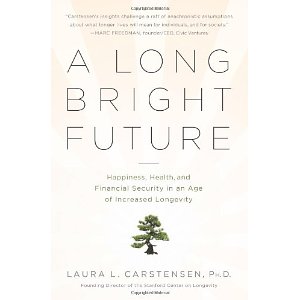Book Notes
 Laura L. Carstensen, A Long Bright Future; An Action Plan for a Lifetime of Happiness, Health, and Financial Security (New York: Broadway Books, 2009), 318pp.
Laura L. Carstensen, A Long Bright Future; An Action Plan for a Lifetime of Happiness, Health, and Financial Security (New York: Broadway Books, 2009), 318pp.
Whatever else your future holds, one thing is almost certain to be true — you will live much longer than your forbears. In the last hundred years in the United States, infant mortality has decreased by 90% and maternal mortality by 99%. The average life span increased by 28 years (p. 44). In the developed world today, average life expectancy is about 78 years, and old age has become the norm rather than the exception. I suspect that we all know a person who lived to be a hundred (like my wife's grandmother).
What to do with all those extra years? We shouldn't look at our last three to four decades as "leftover" years when we "retire" instead of work. Nor should we succumb to the many myths about old age. Carstensen begins her book with five common misconceptions about getting old: that older people are more unhappy (many studies show the opposite), that your biology is your destiny and there's nothing you can do about it, that we should retire as early as possible, that old people consume too many limited resources, and that the individual rather than society as a whole determines how we fare in old age. Carstensen, who founded Stanford's Center on Longevity in 2006, wants to bust these myths by helping us to rewrite our "social scripts" about old age.
This requires us to think in new ways about almost everything — money, work, marriage, family, friends, Social Security, Medicare, etc. In her final chapter, Carstensen recommends a fourfold strategy: to envision, design, diversify and invest. I thought many of her suggestions were idealistic and overly general. She admits that there's a "distinct class divide" between rich people who live longer and poor people who die sooner, and that the vast majority of people living in the two-thirds developing world are mired in systemic disadvantages that shorten their lives (where the most future population growth is projected). These disparities make us "question whether we live in a just society." But whatever you think about Carstensen's suggestions, if you are fortunate enough to be reading her book, you are likely to live a very long time, and you'd do yourself a favor by thinking pro-actively about that in new and creative ways instead of with fear and anxiety. Your last years can be your best years, says Carstensen.


